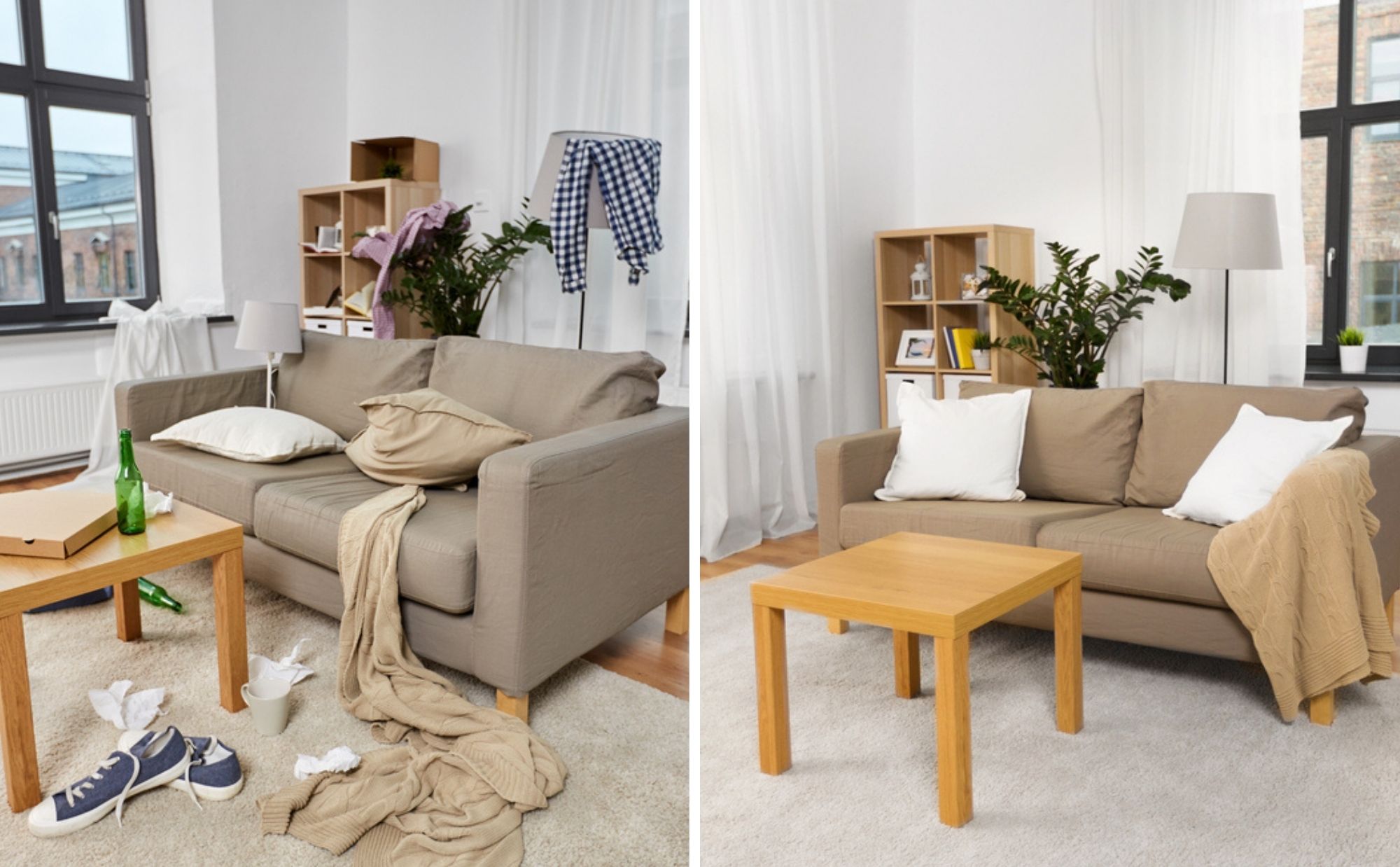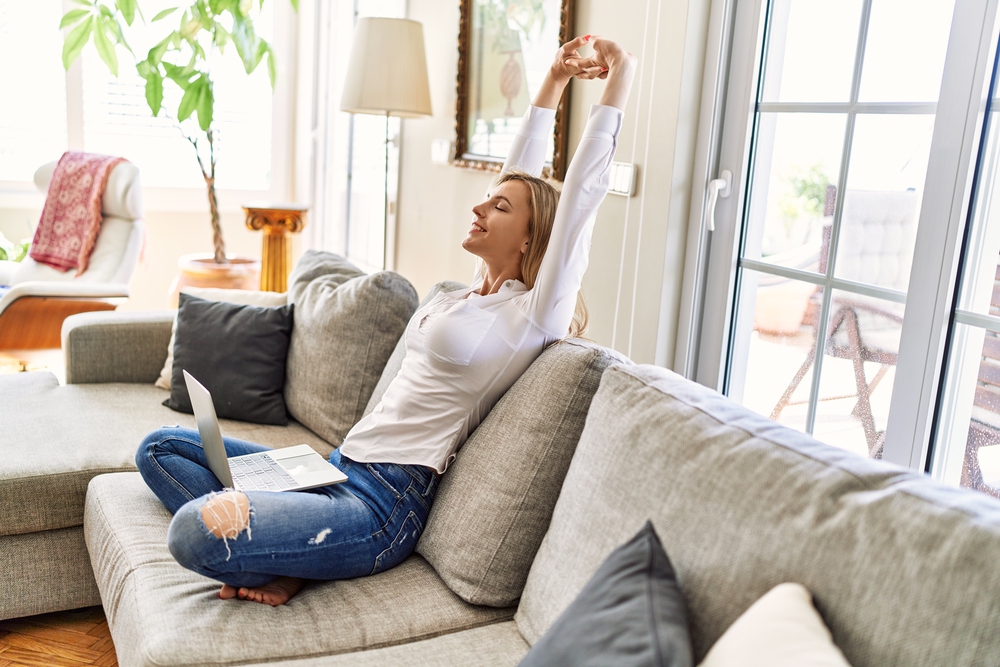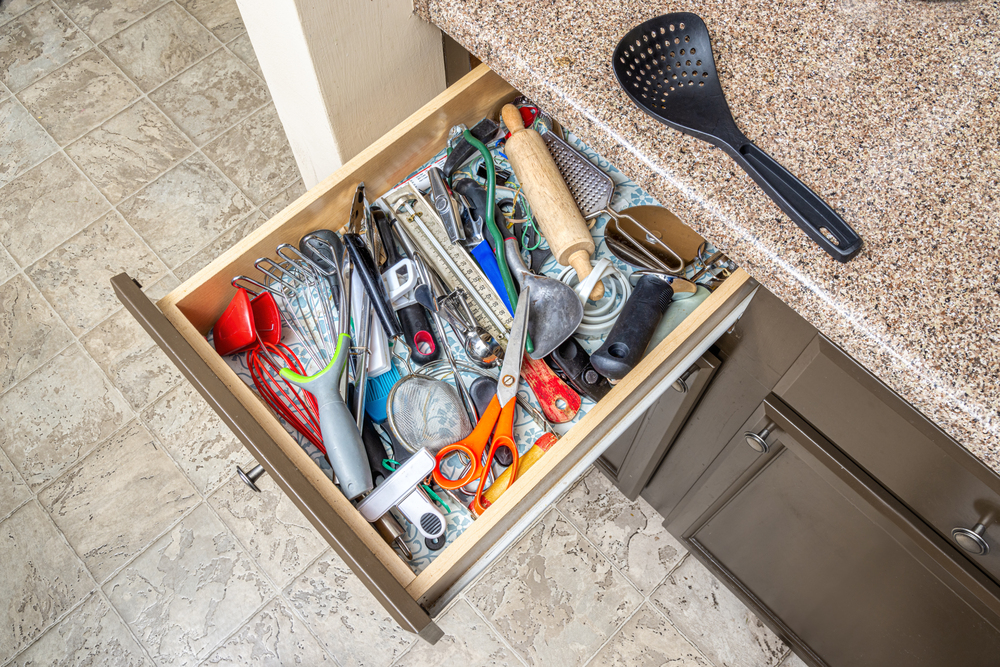Inside: Discover the connection between decluttering and mental health. Learn why a tidy space can bring peace and clarity to your mind.
In our fast-paced world, our spaces profoundly affect our mental well-being. The environments we create and maintain are not just physical locations but reflections of our thoughts and feelings. It’s important to understand how decluttering your home for mental health works and how to start.
A tidy, organized space can evoke a sense of peace and clarity. At the same time, a cluttered environment often breeds stress and anxiety. As we navigate the complexities of daily life, understanding the connection between our surroundings and mental health becomes increasingly vital.
This exploration delves into the impact of clutter on our emotional state, the benefits of decluttering, and practical strategies to reclaim our living spaces. By addressing the chaos in our homes, we can pave the way for a more serene and productive existence, affirming that a well-organized environment is essential for nurturing our mental well-being.
The spaces we inhabit play a significant role in shaping our mental well-being in our daily lives. The environment around us can either foster tranquility or contribute to stress and anxiety.
As we consider the impact of clutter on mental health, it’s important to recognize how a disorganized space might affect our mood and productivity.

Table of contents
Impact of Clutter on Mental Health

Living spaces filled with clutter often negatively impact mental health. Disorganization can increase stress, making it hard to unwind at home.
Research has shown the strong ties between our surroundings and our mood. When things are scattered, anxiety tends to spike. The constant visual distractions mean our brains work overtime to ignore the mess, robbing us of peace and calm.
Studies highlight the link between messy environments and mental health difficulties such as anxiety and depression. It’s like carrying an invisible weight each time you step over piles of old magazines or dodge a mountain of laundry.
Clutter doesn’t just steal your space; it can shrink your mental bandwidth. When surrounded by chaos, focusing on a single task becomes almost impossible.
The emotional effects are significant, too. Not being able to find what you need adds to daily frustrations, sometimes leading to mood swings and decision fatigue. Researchers find that when clutter reigns, feelings of inadequacy and overwhelm aren’t far behind.
Even deeper issues can arise as clutter compounds feelings of self-doubt and diminishes self-esteem. With each new disorder layer, the cycle spins further out of control. When homes become cluttered labyrinths, it often signals a mind that’s also out of sorts.
As we explore this topic, remember that clearing clutter isn’t just about tidying up spaces. It’s about reclaiming clarity and balance. For those trapped inside their own four walls, tidying up can become a beacon of hope.
Benefits of Decluttering

Decluttering has the power to lift moods, as it transforms our living spaces into havens that ease our stress and enable us to breathe a little easier. When we clear away the clutter, we aren’t just tidying up—it’s more of an emotional and mental de-cleanse.
An organized space enhances productivity. Say goodbye to time wasted frantically searching for keys or important documents. Creating designated spots for everything enables you to focus on what truly matters, be it work, relaxation, or spending quality time with loved ones.
This organization lifts self-esteem, granting you a renewed sense of control and competence.
Each room that gets revamped is like a little victory, and those wins stack up. It’s a journey of perseverance and patience—two qualities that pay dividends far beyond the walls of your home.
Decluttering boosts relationships, too. Removing that barrier allows for clearer communication and more enjoyable social gatherings. Transforming your space makes it a welcoming bungalow, not only for visitors but also for the emotions and experiences that fill it.
On the health front, a decluttered environment contributes to physical well-being. Less clutter means fewer allergens, reduced dust, and improved air quality. It minimizes the risks of tripping or accidentally banging into forgotten objects.
Beyond these advantages, decluttering is an act of self-care. In this exercise of letting go, you gain peace, time, and a dash of joy. Clearing out what no longer serves you makes room for what truly nourishes your life.
Practical Tips for Decluttering

Let’s talk about practical strategies for decluttering. It doesn’t have to be an overwhelming task. Instead, consider it a series of small, manageable steps to reclaim your space and sanity.
Begin with what feels doable. Maybe today, you’re just taming that wild junk drawer. Addressing one small area at a time makes the task manageable, and that sense of achievement from seeing a newly organized drawer is motivating.
Set realistic goals to guide your journey. Earmark specific times in the week, like Thursday evenings or Sunday afternoons, to devote time to different spots in your home. This builds a routine that fits your lifestyle rather than disrupts it, ensuring it’s sustainable in the long run.
Incorporate structure into your decluttering process. Sort items into keep, donate, or toss piles to provide clarity and momentum. Don’t forget about digital decluttering—tackle those emails multiplying like rabbits, or streamline your phone apps to those you use.
Don’t shy away from enlisting help if you find yourself stuck. Sometimes, an extra set of eyes—or hands—can make a difference. Partner with a family member or friend for support, or hire a professional organizer if you need more expertise.
To keep the clutter at bay:
- Sprinkle some motivation into your daily routine.
- Celebrate small victories—be it a tidy shelf or a clear desktop—and reinforce your progress by appreciating the newfound spaces.
- Keep reminding yourself why you wanted to declutter in the first place.
Remember, decluttering is an ongoing process rather than a one-time event. By tackling it with patience and purpose, you’re crafting a home (and mind) that genuinely reflects peace and possibility
Addressing clutter is about more than tidying up; it’s about creating an environment that supports mental clarity and emotional balance. Organizing your surroundings opens the door to a more peaceful and fulfilling life.
In conclusion, decluttering your home is not just tidying up; it’s a decisive step towards enhancing your mental health and overall well-being. By transforming your living space into a more organized and serene environment, you can significantly reduce stress, boost your productivity, and foster a sense of control.
The emotional benefits of decluttering are profound, offering a path to increased self-esteem and improved relationships. Embracing a systematic approach allows you to tackle clutter in manageable chunks, making the process less daunting and rewarding.
Remember, each small victory contributes to a clearer mind and a more peaceful home. As you embark on this journey, know that decluttering is a meaningful exercise in self-care, paving the way for greater clarity and joy in your life.
Keith N. Study on cleanliness and health. Indiana University.
Roster CA, et al. The role of possession clutter in the psychological home. Journal of Environmental Psychology.
Khorana N. Mental health benefits related to cleaning and organizing. Atlanta, GA.
Morgenstern J. Organizing from the Inside Out.
Want more inspiration to keep your home organized and clutter-free? Check out these insightful posts: How to Create a Peaceful Home with Easy Steps for Decluttering, How to Declutter Your Home in a Weekend Challenge, Decluttering Made Easy: 10 Steps to a Cleaner Home, and Small Space Solutions: Declutter & Design Your Dream Home Now.

Leave a Reply